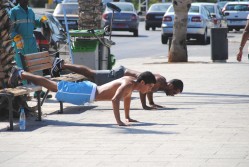
One of the things that shocked me most during my travel to Lebanon in 2010 was how out-in-the-open the Beirut gay scene was. Many of the bars I visited my friend Rami seemed as obviously gay as places here in the United States.
“But you know,” Rami said, as we were finishing up our last drink of the night, “These bars aren’t ‘officially’ gay, even though it’s obvious to you and me that they are.”
“Why not?”
“Because it’s a crime to be gay in Lebanon.”
Laws About Homosexuality in Lebanon
As Rami had informed me, being gay in Lebanon is indeed illegal, although punishment for the law, when it’s enforced, is tame by regional standards. The maximum penalty for homosexual conduct in Lebanon (which Article 534 of the Lebanese penal code characterizes as “contradicting the laws of nature”) is one year in prison.
Lebanon is unique in the Middle East in that it has a sizable Christian population that is represented in its legislature and its courts. Obviously, Christians are far from the authority on how to treat gay people, but one can infer that penalties for being gay in Lebanon would be much more serious is Lebanon was governed by Islamic Sharia, rather than secular law.
The law is rarely enforced and in 2009, a Lebanese judge in the city of Batroun ruled against using it to prosecute homosexuals. Being a tourist in Lebanon makes it even less likely that you will be imprisoned for homosexuality, although deportation or fines aren’t out of the question.
“Bromance” in Lebanon
You may recall my mentioning a phenomenon I call “Arab bromance” when I talked about gay travel in Muslum countries some months ago. To briefly recap, this refers to the tendency of men in Muslim countries (and, to a lesser extent, throughout the developing world) to engage in activities that we Westerners might perceive as being homoerotic or even blatantly gay.
Although, as I mentioned, Lebanon is not a strictly Muslim country, bromance is nonetheless a common sight when you travel in Lebanon. In particular, I was taken by how solidly the crowds both at Ramlet el Baida Beach and the jagged Mediterranean rocks that line Beirut’s urban coastline were male, something made all the more arousing by the skimpy swimsuits — and in some cases, underwear and boxer shorts — the men were wearing.
Now I recognize that these displays of bromance in Lebanon are usually inadvertent and innocent in nature, but not everyone does. I’d been checking out a young man swimming in his skivvies one afternoon at Ramlet el Baida beach and noticed that he’d gone to sit on the rocks a few hundreds meters back from the shoreline. I turned around moments later to see a much older man exposing himself to the poor kid in plain sight. It was probably the most traumatizing experience of my travel to Lebanon.
Public Opinion About Gay Rights in Lebanon
Lebanon is the only country in the Middle East besides Israel to have an organization that fights on the behalf of LGBT people. Although Helem, which started in 2004, is actually registered in Quebec, it enjoys legal recognition in Lebanon. Helem was instrumental in the aforementioned strikedown of Article 534 and seeks to have the law permanently banned nationwide.
In spite of the great work that Helem has done and continues to do in Lebanon, the Lebanese public at large has yet to embrace the LGBT community. Gays and lesbians in Lebanon still face harassment and bullying from members of the community and even police, who’ve been known to raid the homes of suspected homosexuals based on tips from neighbors, co-workers and even family members.
During my travel to Lebanon, I didn’t experience any discrimination, nor witness anybody who left the gay bars I visited in Beirut getting heckled. Part of my having averted harassment is no doubt due to the fact that foreign-ness tends to trump all other characteristics of “being different,” so locals were probably much more shocked by my bright-eyed touristness (for it was my first Lebanon travel experience) than by the occasional limpness of my wrist.
Beirut Gay Bars and Clubs
Although, as I previously mentioned, Beirut lacks “official” gay bars and clubs, a bevy of establishments that cater primarily to gay customers exist. Gay bars in Beirut include Acid in Sin el Fil, Milk in Saifi and Bardot in Hamra, one of the places I visited with Rami.
The environment at gay bars and clubs in Beirut can vary from social, such as how it was at coffeeshop-like Bardot, to downright raunchy at discos like Milk and Vice-Versa, where it’s common for public sex acts to occur and to fall victim to the lures of Lebanese gay escorts. Although no one would probably bat an eye if you kissed another man inside a Lebanese gay bar, I would advise using extreme discretion for anything more, as police have been known to raid Beirut gay bars.
Will you be arrested or imprisoned for homosexuality when you travel to Lebanon? Probably not. But I would still advise watching your back, particularly when leaving gay bars and clubs in Beirut.

Robert Schrader is a travel writer and photographer who’s been roaming the world independently since 2005, writing for publications such as “CNNGo” and “Shanghaiist” along the way. His blog, Leave Your Daily Hell, provides a mix of travel advice, destination guides and personal essays covering the more esoteric aspects of life as a traveler.








